First posted, August 2016
One
August, 1956 –The night before the hurricane, I listened to the bugle calls before I went to sleep, as usual. The calls weren’t played on a real bugle, of course, but from a record, blasting out of big loudspeakers somewhere in the barracks on the other side of the base, where the airmen lived. They played one call at nine o-clock, another long one, called “Tattoo,” at nine-thirty, and the last one, Taps, at ten.
 Unless there were a lot of planes taking off or landing, the bugle calls carried on the still night air over the tall palm trees and all the way to the family housing, where they echoed down our curving streets, which ran along the edge of the base facing the sea.
Unless there were a lot of planes taking off or landing, the bugle calls carried on the still night air over the tall palm trees and all the way to the family housing, where they echoed down our curving streets, which ran along the edge of the base facing the sea.
That sea, the Caribbean, was only two blocks from our house at 131 C Street. That is, it was two blocks to the edge of the land; from there to the water was another two hundred feet or so, down a cliff.
The side street by our house ran right up to the cliff, and there was no fence. But even though lots of kids lived nearby, we didn’t worry about falling over the cliff. It didn’t drop straight down, and was covered with thick bushes and vines, which would catch and hold anything as small as a person.
We had other things to worry about at Ramey Air Force Base, though, things like mosquitoes and huge roaches two or three inches long, and the fact in 1956 there was no TV station with programs in English to watch. And since I was thirteen, I also worried about whether any of the pretty girls at school would ever like me, and if I could stand up to the tough boys if someday I had to.
But none of that was worrying me this particular night. It was all small-time compared to Hurricane Betsy. Betsy was big and dark and full of dangerous high winds and driving rain. After wandering aimlessly around out in the ocean for several days, the storm was now bearing down on the island of Puerto Rico, and on Ramey Air Force Base, due to hit us any time.

In truth, I wasn’t really very worried about Betsy; if anything, the idea of a hurricane was rather exciting. It was late summer, school had been out for two months, and there wasn’t all that much for a kid to do on the base. Mostly I hung out at the base library, not only because I loved to read, but because the library was new and, even better, air-conditioned. In Puerto Rico, that made a lot of difference. Our house was not air-conditioned.
Come to think of it, our house wasn’t a lot of things. For one, it didn’t seem big enough for a family with eight children; the four of us boys were crowded into one room, on two sets of bunk beds. And for another it wasn’t much to look at: just a low boxy rectangle made out of concrete cinder blocks with a flat roof.
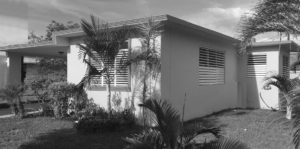
Practically everything on the base had a flat roof, except some long wooden buildings down by the high school that had been put up during World War Two; they had slanted roofs, and looked a little rickety. They were supposed to be just temporary, but were still being used.
Our house also had a carport, banana bushes, a hedge in back and some low plants in the skimpy front yard with little fringed leaves that snapped shut like they were scared when you touched them.
All the houses on our streets were alike, except that some had palm trees in their yards. We had a new electric clothes dryer out back by the kitchen door; there wasn’t room for it inside. We also had a new dishwasher, the first our family ever had.
I was very glad to see that dishwasher, since I had been made to help wash dishes since I was six. Unfortunately, after we set it up, Filomena the maid turned the knobs the wrong way and it broke. The parts for it had to be ordered from Miami, which meant it would be weeks or months before it got fixed and I could again escape dishwashing.
One good thing about our house, though, was something I had just learned: It was supposed to be hurricane-proof. The flat roof wouldn’t blow off; the cinder block walls wouldn’t cave in. And there was no glass in the windows; instead we had louvers, little slats in the frames, which opened and closed with a crank. No window glass meant no hurricane winds would shatter it and send pieces flying around cutting us up. That seemed like a very good idea, once I understood it.
The louvers by the foot of my bunk bed were about half open. After the bugle sound of “Tattoo” faded, I crawled down and peeked out. Across the street, in the glare of a single street lamp, I could make out the iron pipe frame of some big swings. Along with a little push-it-yourself merry-go-round, they were as much of a playground as we had.
The swings were moving just a little in the rising breeze, as if ghosts were gathered and rocking gently back and forth, talking something over. But the base was quiet; it was hard to imagine something big and dangerous was about to happen.
Our maid Filomena seemed to know something was coming, though. She didn’t really speak any English, and we spoke no Spanish. But mother finally figured out that she wanted to go home early, to help her friend Carmen, who worked next door at Rosalie’s. Rosalie told mother that last week Carmen had asked for a few days off work. When asked why, she explained in her broken English that she had to build herself a house.

“A house?” Rosalie said. “How can you build a house by yourself, and on two dollars a day?” That was a day’s pay for a maid on the base then. I guess it seemed like a lot of money to her. Carmen shrugged, the way she did, and said that the house would only cost twenty-five dollars, and she was hoping Rosalie would give her that too.
“Twenty-five dollars?” Rosalie asked. “How are you going to build a house with only twenty-five dollars?” My mother echoed the question, as did the rest of us when she repeated the story at dinner.
“Si,” Carmen had told Rosalie, “viente cinco, twenty-five dollars.” It turned out that for Carmen, as for many of the Puerto Ricans, a house was not much more than some pieces of wood or flattened out tin cans on a frame, covered with plastic or some corrugated tin, put together with the help of friends like Filomena.
In some places hundreds, thousands of these little shacks were huddled together into shantytowns. This idea of a twenty-five dollar house seemed strange to us, because our air base was like a piece of prosperous America that had been cut loose, wrapped all around with a high fence, and dropped down on the edge of the island. Our family had come there from California, and didn’t know anything much about Puerto Rico, or its mostly poor people.
I had only been off the base a few times myself, for basketball games, a picnic, and a bus tour to the capital, San Juan, 90 miles east, and had never paid much attention to the people, or their houses.
In fact, the closest I had come to one of these shanty-towns was in an airplane several thousand feet above it. Besides hanging around the library, I also did some work for a flying club on the base. Instead of paying me money, a pilot named Howard took me on flights in one of the club’s little Aeronca Champ airplanes. That was great: I thought I wanted to be a pilot, like my father.

Once near the city of Arecibo he had pointed out the cockpit window at what looked like a long patch of rust on a stretch of wide white beach. “Shacks,” he shouted over the engine noise.
I glanced down. Most were covered with old sheets of tin and flattened cans, which is where the rusted look came from.
“Isn’t that a bad place to put their shacks?” I shouted to him. “The ocean could just come in and wash them all away.”
He nodded and then shrugged, as if to say, What could you do? I didn’t know.
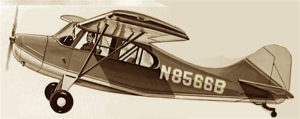
But evidently Filomena thought she could do something. So mother let her go home early, even though this meant mother had to handle all our getting ready for Betsy’s arrival by herself.
Mother was by herself because as soon as it became clear the hurricane was headed our way, the Air Force told all the pilots at Ramey to get in their planes and clear out. The planes were big and expensive, and the Air Force didn’t want the storm to damage them on the ground.
My father was one of the pilots. He flew a B-36, a huge, noisy bomber. There were a lot of B-36s at Ramey, and all that afternoon we listened to them thundering down the mile-long runway and into the air, headed to Florida or somewhere else safely out of Betsy’s windy reach.

We older kids helped some in getting ready, bringing all the toys and bicycles inside. It made the living room crowded, which just increased the feeling of being on an adventure. But we were getting fidgety as evening turned to night and Betsy still hadn’t arrived. I felt downright cheated when bedtime came with no sign of her.
And then there I was, peering out the louvered window at a couple of swings moving gently in the breeze. Big deal.
I cranked the louvers closed and laid back down. Maybe Betsy had suddenly turned, and wouldn’t hit us after all. Hurricanes were like that.
In a few minutes the last bugle call, “Taps,” sounded over the loudspeakers. But it seemed fainter than the earlier ones. Maybe it’s because the wind is getting louder, I thought. Or maybe it was just because the window was shut tight. In any case, I was soon asleep.
I slept late that morning, which I liked to do, and my brothers knew enough to leave me alone. So when I finally stirred and opened my eyes, the other beds were empty, and it was late morning.
Only it didn’t look like morning. The room was almost dark, as if the sun hadn’t yet come up. And there was a loud roaring all around me, like a hundred angry lions, or a thousand electric fans.
I sat straight up. It was Betsy. The hurricane was here.
Two
Once you got used to the noise, though, Hurricane Betsy wasn’t all that bad. Some water leaked under the front door, but that was about all.

The seven other kids were crowded into the living room, playing with toys, trying to read in the gray light, or bickering about this and that as we often did. After eating something I went back to my bedroom, figuring to pass the time by finishing the latest Hardy Boys mystery story from the library.
I had read practically all forty of the Hardy Boys mysteries, plus half the Nancy Drew stories too. They were starting to seem childish to me; I was ready to try some more grownup books.
But this particular one, called The Sinister Signpost, was  pretty good. It centered on a mysterious sign shaped like a big red hand that one of the Hardy Boys saw suddenly turn and point in the direction of the next big clue to the mystery.
pretty good. It centered on a mysterious sign shaped like a big red hand that one of the Hardy Boys saw suddenly turn and point in the direction of the next big clue to the mystery.
I had just peeked ahead to the last chapter, where the same red hand was supposed to point out who did it, when my brother Clair came in and tapped me on the shoulder. “You wanna see somethin’ cool?” he said, beckoning me to follow.
We went down the hall to the next bedroom, where my sisters slept. Evelyn, the oldest, had cranked open the louvered window next to her bed just a bit and was peeking out. “Omigod,” she cried, “get a load of this!”
I leaned over her and put my eye to the opening. Through what seemed like curtains of solid rain I caught glimpses of the playground across the street. The swings were going like crazy, flying far higher than any of us had been able to make them go, then careening back way out to the other side, as if invisible giants were riding them full blast. The little merry-go-round, with nobody on it, was whirling in a blur, faster than I had ever seen it go.
It made me laugh, and the other kids crowded in to take a look. In a minute, though, the wind gusted harder and rain spewed in through the crack. We closed the louvers and went to wipe our eyes and tell mother.
Sometime in the afternoon the wind quieted down all at once. Mother explained that the eye of the hurricane was passing over, where the winds were calm. When the eye was past us, she said, the winds and rain would start up again. And sure enough, they soon did, stronger than before, I thought.
It was like that the rest of the day. For dinner we made tunafish sandwiches and lit candles. Just as mother finished saying grace, a loud bang came from out back, then another and another.
I raced to the kitchen window, and cracked the louvers.
It was our new dryer. It seemed to be doing slow somersaults across the back yard, going end over end and making another banging noise each time it turned.
“I’ll go pull it back,” I said bravely, and started to open the door.
“Don’t be silly,” mother shouted. She pushed the door shut and locked it. “That wind would blow you right into the ocean! Leave it alone.” She was right, of course. I closed the louvers and toweled the rain off my face.
After that, it was just more wind and rain and the Hardy Boys. By bedtime, it seemed the wind was starting to slow, but it was still too loud to hear any bugle calls.
The next morning was bright, sunny, and quiet. Hurricane Betsy was gone. When I got up and went out, everything, even the sky, looked washed and rinsed squeaky clean. At the playground, the swings and the merry-go-round were still. Things were back to normal.
Well, sort of normal. Most of the big palm trees had been knocked down. Our banana bushes had been shredded. We had to empty water out of the new clothes dryer and push it back under the roof. Once upright we found that the control knobs had broken off. But when mother got it plugged in and used pliers to turn the little metal piece that held the knob, amazingly it started to rumble and worked fine.
While we cleared out our yard, the airmen from the barracks were cleaning up the rest of the base. That took several days. Hundreds of trees had been knocked over. One by one they pulled the trees out to the streets, chained them up behind big trucks, and dragged them from wherever, across the base to the family quarters, and down C street right past our house.
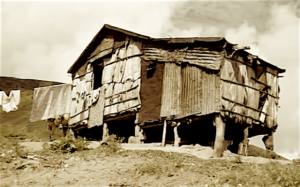
It was like a parade that went on and on just for our benefit. The trucks turned by our house onto the side street, and pulled the trees the two blocks to the cliff. There they pushed them over, and watched them go crashing and rolling down toward the ocean. After the first day the muddy roots left a trail of thickening hardened mud all the way down C Street and around the corner to the cliff.
A day or so later, when the air police let us leave our neighborhood, I walked down past the high school just to see what else had happened. The school and the newer houses and offices with the flat hurricane-proof roofs looked fine.
But across from the school, where the temporary offices had been, all that remained was big long piles of torn up lumber and soggy papers. Betsy had smashed every one of those old wooden buildings into so many tons of matchsticks.
Oh well, I thought, the Air Force was planning to get rid of them anyway. Betsy saved the Air Force the trouble of tearing them down. But I wondered who would get stuck sorting out all the soggy papers.
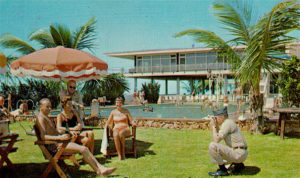
A few days later, I went back to the flying club and did some work there, helping the mechanics while they were working on the little club planes. That afternoon Howard took me up again in the Aeronca Champ. We flew along the coast toward San Juan.
When we passed Arecibo, I looked down. There by the water, where the big rusty patch had been, I saw what resembled a huge spread-out junk pile, with paper and sticks and mud all strewn along the beach.
I tapped Howard and pointed. He nodded, and shouted over the engine noise, “Bye-Bye shantytown.”
When I got back home, I told mother and father, who had flown his B-36 back from Florida that day, about the mess on the beach.
Mother said she wasn’t surprised. Filomena had come back to work that day, she added, but only for a little while. She had asked mother for the rest of the week off. She had also asked for twenty-five dollars. She too, it seemed, now needed to build a new house.
“What about Carmen?” I asked.
There was no sign of her, mother said. Rosalie had come by to ask Filomena about her, but all Filomena did was shake her head, wave one hand and say “Gone. Gone.”
Mother gave Filomena the twenty-five dollars and she left.
That night the bugle calls echoed down C Street again as usual. The Air Force did haul away all the busted wood and soggy paper from the smashed offices, and pretty soon new offices were built there. They all had flat roofs.
 When school started again, the pretty girls still didn’t notice me, but I didn’t have to stand up to any of the tough guys either. And no more hurricanes hit Puerto Rico while we lived there.
When school started again, the pretty girls still didn’t notice me, but I didn’t have to stand up to any of the tough guys either. And no more hurricanes hit Puerto Rico while we lived there.
I don’t know what ever happened to the wrecked shantytown on the Arecibo beach, and nobody ever saw Carmen again.
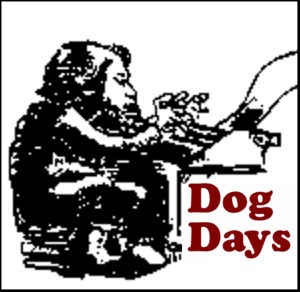
Copyright by Chuck Fager
More “Dog Days” posts . . . .
>Three Homelands: A Revelation in Ireland
>Grace In Your Face: Remembering Bill Kreidler
>Three Homelands: A Revelation in Ireland
>Jim Corbett, The Desert Quaker Prophet of Sanctuary

Good story, Chuck. Thanks.